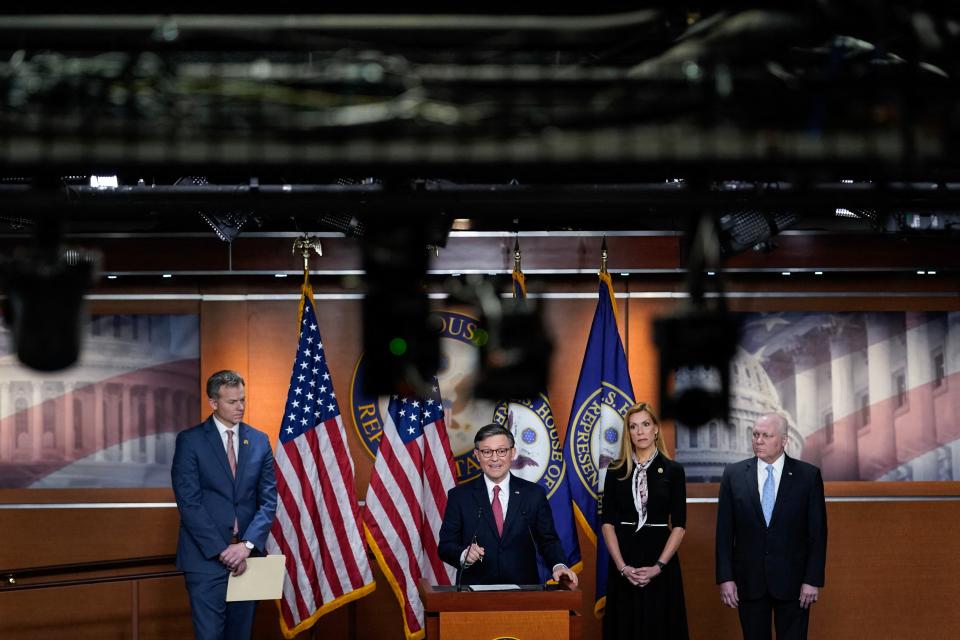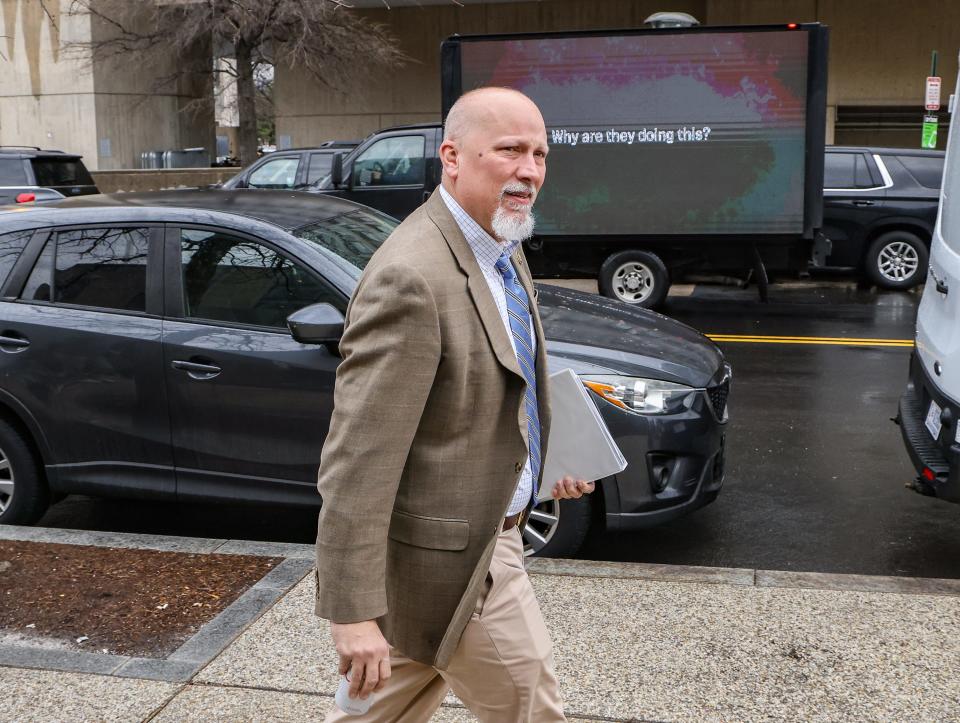Congress passes short-term deal to avert partial government shutdown
WASHINGTON – Congress passed a temporary agreement to avoid a partial government shutdown on Thursday, as lawmakers continue to work behind the scenes to flesh out a long-term plan to keep the government's doors open.
The House passed the legislation by a bipartisan vote of 320-99, with the vast majority of Democrats supporting it alongside more than half of GOP lawmakers. It then passed the Senate 77-13.
The stopgap – referred to as a continuing resolution – will be Congress’ fourth extension since an original funding deadline in September 2023. This time, however, lawmakers appear to be making significant progress towards a long-term agreement for the nation.
The extension lawmakers passed on Thursday was contingent on a prior pact that would provide one massive tranche of government spending. That money is now slated to expire on March 8 under the new continuing resolution. The rest of the federal government's funds are scheduled to expire on March 22.
“We are in agreement that Congress must work in a bipartisan manner to fund our government,” congressional leaders said in a joint statement on Wednesday announcing the deal.
But keep this in mind: The text of a plan to provide more permanent funding for government agencies, beyond the March deadlines, hasn't been released yet. While House Speaker Mike Johnson, R-La., said at a weekly news conference that text will be unveiled over the weekend, it may not be a done deal.

What government functions does the latest spending agreement extend?
Congress must pass 12 individual spending bills to fund the government on a long-term basis. Six bills will expire on March 8, with functions related to:
Agriculture, Rural Development, Food and Drug Administration
Commerce, Justice and Science
Energy and Water Development
Interior
Military Construction and Veterans Affairs
Transportation, Housing and Urban Development
The other six will expire on March 22. They're related to:
Defense
Financial Services and General Government
Homeland Security
Labor, Health and Human Services, Education
Legislative Branch
State and Foreign Operations
While it appears Congress has made significant progress towards funding the government, Wednesday was still the first time negotiators announced they had come to an agreement on the pivotal spending bills.
Additionally, the latter six bills are considered to be significantly more controversial than the first six. Rep. John Rutherford, R-Fla., a member on the House Appropriations Committee, expressed doubt about whether lawmakers could meet the March 22 deadline, saying he was “not very (confident) honestly.”

Conservatives rage at House Republican leaders (again)
Ultraconservative House lawmakers have repeatedly criticized Republican leaders in the lower chamber over short-term funding extensions. Unsurprisingly, they did so again leading up to Thursday’s vote.
Johnson told GOP lawmakers in a conference call last week that Republicans have been unable to secure significant conservative victories because of the House GOP’s infighting, specifically pointing to hard-right lawmakers repeatedly stalling action on the House floor.
Rep. Chip Roy, R-Texas, a member of the ultraconservative House Freedom Caucus on Wednesday pushed back on Johnson’s negotiating stance, telling reporters it “is crap. It is an absolute falsehood.”
“If the speaker wants to get the right outcome, fight for it. Don’t go out there and say this nonsense that he can’t get it done,” Roy said.
Rep. Warren Davidson, R-Ohio, said he was disappointed again in leadership for putting another stopgap up for a vote.
“I’m disappointed that he hasn’t chosen to dig in and fund a government that will secure the border,” Davidson added, echoing his hard-right colleagues' push for Congress to address the crisis on the southern border first before funding the government.

Roy, along with his conservative colleagues, have lobbied Johnson and GOP leadership to pass a year-long spending plan that would consequently trigger 1% spending cuts across the board for the government. That proposal has virtually no chance of passing either the House or Senate, and lawmakers from both sides of the aisle have balked at the idea.
The automatic spending cuts from a full-year deal would notably slash defense spending, which Rep. Ryan Zinke, R-Mont., strongly opposes. He said on Thursday morning that “the same game plan” won’t be enough to “defend this country.”
For Johnson’s part, this short-term extension is one of the few times the speaker has made a clear-cut decision. The Louisiana Republican's speakership has been at times confusing to rank-and-file GOP members as he has kept his cards close to his chest at critical moments.
“I think he’s doing what you’re supposed to do. That’s (to) bank the wins that you can get with the power that you have,” Rep. Patrick McHenry, R-N.C., who has criticized Johnson, told reporters on Thursday. “He is conforming with the reality of the situation. Politics is trying to achieve the best outcome you can in the environment you’re in.”
“It’s a lot of drama to lead up to something that is inevitable but the speaker should be commended for taking a wise course of action in the environment we’re in,” he added.

A last-minute hold-up in the Senate
The funding extension passed with more than two-thirds support in the Senate, but not before multiple lawmakers tried to force votes on attaching separate legislation to the funding package. All of those votes failed.
The senators were able to hold the temporary plan up until they got what they wanted because all 100 senators are required to speed up the consideration of legislation in the upper chamber. That means Senate leaders needed the blessing of all 100 senators to move forward with a vote at all.
Sen. Rand Paul, R-Ky., forced consideration of his bill to bar the Federal Reserve from buying state debt. And Sen. Ted Cruz, R-Texas, also demanded a vote on H.R. 2 – House Republicans' hard-right border bill that even many Senate Republicans have acknowledged would never pass the upper chamber.
Sen. Josh Hawley, R-Mo., told USA TODAY he doesn't want a government shutdown and that he supported the first few funding extensions in the fall to give lawmakers on the appropriations committees more time to negotiate.
"But it's become clear in this calendar year that that's just not happening," he said. "They've had months to reach an agreement. This is just, I believe, on leadership's part a failure of will."
This article originally appeared on USA TODAY: Congress passes short-term deal to avert partial government shutdown
